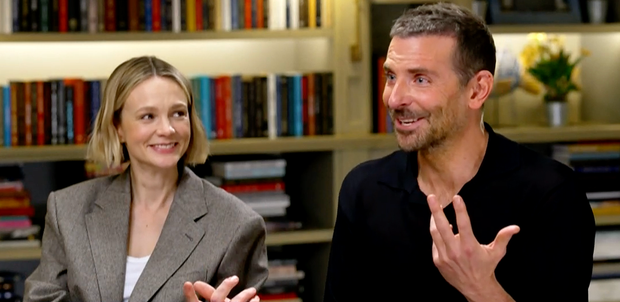Bradley Cooper says his long-standing fascination with conductor and composer Leonard Bernstein, a legendary figure in classical music, traces back to cartoons.
“It started with Tom and Jerry and Bugs Bunny as a kid, watching them conduct,” Cooper told “CBS Mornings.” “And asking Santa Claus for a baton when I was about 8 or so, and then, just being obsessed with conducting.”
“There was a magical quality that you just do that, and sound comes out, you know, and that’s where it began,” he said in a recent interview. “And it was just this incredible feeling of being a maestro, really.”
Following his directorial debut with “A Star is Born,” Cooper is now bringing Bernstein’s life to the screen with his second film, “Maestro.” In addition to directing the film, Cooper plays Bernstein, who mesmerized audiences all over the world as a conductor and also composed popular musicals like “West Side Story.”
“It’s all one thing,” Cooper said of acting and directing. “I really see it as filmmaking. You know, it starts with an idea, and then you write it. And then there’s something in me to be the character.”
CBS Mornings
Cooper prepared for the role for six years, and chose Carey Mulligan to play Bernstein’s wife, Felicia Montealegre. Together, the actors portray the couple’s complex relationship, which was documented in love letters the couple sent each other.
“There was something so iconic about her and so magnetic and wry and deeply intelligent,” Mulligan said about Montealegre. “But also this devotion that she had for him from the moment she met him, I think. It’s just so beautiful, but there’s a real … struggle within her.”
The struggle emerged in part because of Bernstein’s affairs with men, a bold subject for its historical context. But despite everything they went through, they were truly in love, Cooper said.
“That’s the reason why I wanted to make the movie was, I believe that they found each other’s soulmates,” Cooper said, adding that he believes their relationship was both “complicated” and “universal.”
Cooper also described the challenge and thrill of conducting, which the actor did live for the film — an experience he said he found more terrifying than singing at the Oscars.
“All the orchestra, this is what they’ve done their entire life. And I’m sitting there talking like Leonard Bernstein, directing them. And they’re going, like, ‘Who is this guy?’ You know, and, ‘He’s gonna conduct us?'” said Cooper.
“And by the way, I messed it up the whole first day,” he said.
Mulligan said, “hard is the fun stuff.” Adding, “That’s, I think that’s what we’re looking for…If it’s not terrifying, it’s kind of not worth doing. Like, you want to do something that is terrifying and daunting.”
Bernstein’s family was involved in the film’s production. His children said Cooper included them in every step of making the film, and they were quick to come to his defense when he faced criticism over the summer over the use of a prosthetic nose for his transformation into Bernstein.
Cooper said he had considered not using a prosthetic.
“I thought, ‘Maybe we don’t need to do it’…But it’s all about balance, and, you know, my lips are nothing like Lenny’s, and my chin. And so we had that, and it just didn’t look right,” Cooper said.
Bernstein’s children wrote a letter of support for Cooper, saying, “It breaks our hearts to see any misrepresentations or misunderstandings of his efforts.” Cooper said he called them, to thank them.
“I read it, and I called Alex [Bernstein] to thank him…and I remember I called him on the phone, and I heard his voice. And then I couldn’t believe it, but this huge emotional exhalation came out, and I just was crying so hard, I couldn’t even thank him. And he started crying,” said Cooper.
“And it was an incredible moment. And I, sometimes you don’t even know what’s going on, you know…I couldn’t believe that gesture. It was very moving to me,” he said.
